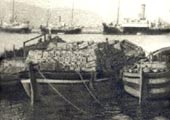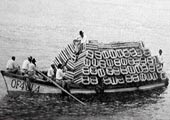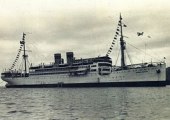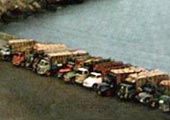|
US strategy in banana tiff: Divide and conquer.
EU nations friendly to US policy won't be hit with trade tariffs
WASHINGTON -- As the United States prepares a final hit list of European products facing punitive tariffs in the EU-U.S. banana fight, U.S.
trade diplomats are selectively rewarding or punishing individual nations within the European Union based on each country's friendliness to the U.S.
position.
Pending an EU-U.S. summit in Washington on Dec. 18 -- which will feature high-profile rhetoric about EU-U.S. economic cooperation -- the United States' hardball strategy on bananas is one of divide and conquer.
The administration's trade diplomats are rewarding the "good boys" and punishing the "bad boys" with threats of huge tariff increases, European ambassadors and industry lobbyists are saying.
"That's a traditional tactic which the United States government applies from time to time. It is a good way to divide our member states. It has worked before," Hugo Paemon, EU ambassador to the United States, said in a telephone interview Tuesday.
European nations like Germany, for example, that are supportive of U.S. demands for easier access to Europe for Chiquita and Dole brand bananas are being exempted from the list.
Others, like France and Austria, which are trying to protect the European market in favor of banana producers in former colonies in Africa and the Caribbean, find their companies are being targeted, European officials say.
By targeting producers from individual countries within the 15-member EU trading block, the United States is attempting to undermine the EU's common policy by fomenting internal disputes.
Finland, for example, does not have historic colonial ties to Africa nor the Caribbean and thus has no stake in the EU's development policies toward banana-producing countries.
But Finland is a big exporter of paper and wood products to the United States. Thus, by threatening heavy tariffs on Finish commodities, the United States seeks to convert Finland into an advocate for U.S. trade policy.
"They start with a long list and then the negotiations begin," Mr. Paemon said.
The U.S. Trade Representative's Office, a branch of the White House charged with conducting negotiations with U.S. trading partners, published a comprehensive "draft" list of European products in November that it said would face double tariffs if an agreement is not reached.
The USTR's economics unit headed by David Walters has been doing the actual work on narrowing the list of European products, an agency spokesman said.
USTR spokesman Jay Ziegler said the U.S. approach has been to pick European products for punitive tariffs that would generate the least domestic backlash in the United States, since it is U.S. importers who would be asked to pay the new fees beginning in January.
"The objective is to secure the greatest amount of leverage in identifying European products that does the minimum amount of harm in the domestic arena," Mr. Zeigler said.
The banana row between the United States and Europe has been going on for 10 years. The current deadlock stems from fallout this year over a World Trade Organization ruling that Europe's banana import regime was illegal under global multilateral trading rules because it discriminates against U.S. brands Chiquita and Dole.
Europe drafted a new import regime, which the United States now asserts does not comply with the WTO ruling. Under WTO procedures, the two sides can seek further arbitration, or the United States can impose unilateral retaliatory sanctions, which in fact is what Congress and the White House have said will happen.
Last week a testy exchange of letters between U.S. Trade Representative Charlene Barshefsky and EU Trade Minister Sir Leon Brittan left both sides toughening their positions and headed toward a confrontation.
The USTR has said it will issue the final list of retaliatory tariffs on Dec. 15, a bad sign for the coming summit between EU President Jacques Santer and U.S President Clinton.
Aides to the two leaders are planning to focus the summit meeting on the Trans-Atlantic Economic Partnership, a bilateral discussion between the United States and the EU on reducing non-tariff barriers to trade and setting up a free-trade zone in services. It is meant to help set the stage for EU-U.S. cooperation for what will be difficult multilateral trade liberalization talks beginning in the WTO next year.
Mr. Santer and Mr. Clinton also are expected to consult on a coordinated approach to the worldwide economic threat posed by crises in Asia, Russia and Brazil. The United States and the EU are the two stable and still-growing regions in the world today.
In the midst of this, the tiff over bananas has ballooned to the point of triggering a serious trade fight if the U.S. invokes retaliatory tariffs. Further, looming behind bananas is an even more difficult and similarly contested fight over European barriers to U.S. exports of hormone-fed beef.
"We think the administration has boxed itself a little bit in the corner with this," said Mr. Paemon. "There are certainly more important
problems in the world than that for us to focus our attention on."




U.S. Threatens EU With Tariffs As Split Over Bananas Widens
WASHINGTON -- The U.S. said it will slap punitive 100% import duties on 16 European products -- from pecorino cheese to electric coffee makers --
unless the European Union modifies its banana-import policy.
The items account for nearly $600 million in EU-U.S. trade. That is a tiny slice of the $400 billion in annual commerce, but perhaps enough to
ignite a trade war if the six-year dispute isn't settled before the tariffs take effect, as soon as Feb. 1.
See the U.S. Trade Representative's Web site for an Adobe Acrobat version of the full tariff schedule. * * *
Tensions Increase in Banana War as EU and U.S. Exchange Threats (Dec. 16)
EU Seeks Judgment From WTO on Disputed Banana Import Rules (Dec. 15)
Will Bananas Peel Apart EU, U.S.? Trade Dispute Risks Wider Relations (Dec. 14)
EU Condemns U.S. Threat to Impose Trade Sanctions (Nov. 10)
The retaliation "is intended to send a clear and unambiguous message that the U.S. will insist that other countries meet their trade obligations just as we meet ours," Peter Scher, a U.S. special trade ambassador, said.
The products, culled from a longer preliminary list issued last month are from 13 of the 15 EU member states. The U.S. didn't penalize Dutch and Danish products because those countries have opposed EU banana policies.
The U.S. may add certain pork and olive products to the list during the coming weeks.
The European Commission said the listed items, which include cashmere sweaters and candles, represent $591 million in exports to the U.S.
The announcement, though expected, provoked an angry response from EU Trade Commissioner Sir Leon Brittan. "It is difficult to think of a more obvious breach of the multilateral trade system than to take the law into your own hands in defiance of the rules," he said.
EU trade policies favor imports from former European colonies in the Caribbean and Africa. The U.S., prodded by Cincinnati-based Chiquita Brands International Inc. and its chief executive officer, Carl Lindner, argues the policies discriminate against U.S. companies that market Latin American
Now the two sides are arguing about whether the resulting EU revisions bring its policy into compliance with international trade rules.
While both sides says they still want to resolve the matter through the WTO, each accuses the other of throwing up roadblocks. The chances of a quick WTO decision received a setback Monday when two requests for dispute-settlement panels on bananas were blocked.
The U.S. says the case is a crucial test of the viability of international trade and dispute-settlement rules, especially as imports of cheap steel rise. "If it doesn't work, I fear the protectionist sentiment in this country and elsewhere will be that we shouldn't use this system," Mr.
Scher said.
Barring a negotiated solution, the U.S. will impose the tariffs by Feb. 1. The implementation could slip to March 3 if the EU appeals the scale of the retaliation, which is intended to impose costs equal to the damage the banana policy allegedly inflicts on U.S. companies.
MICHAEL M. PHILLIPS, with Julie Wolf contribution.
|